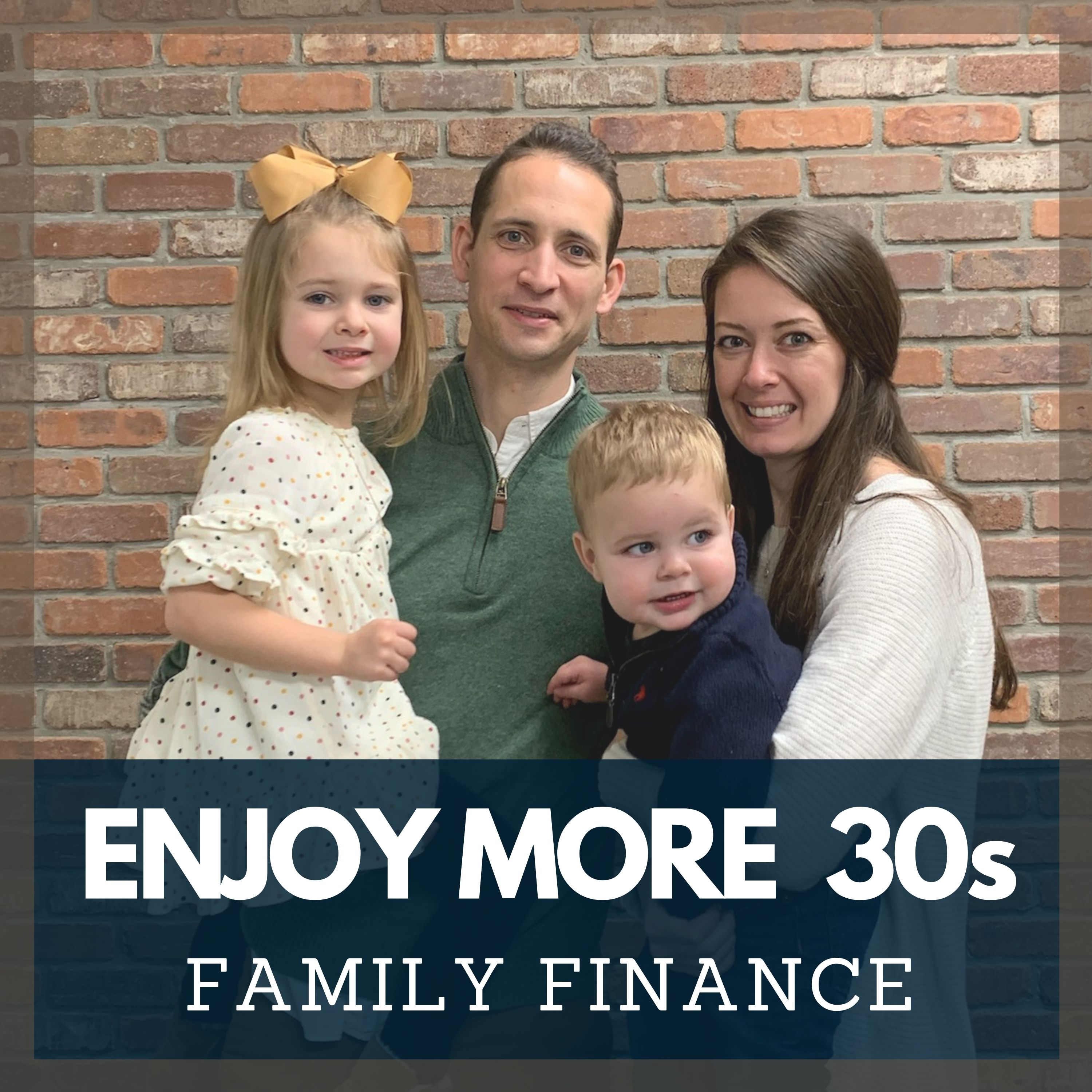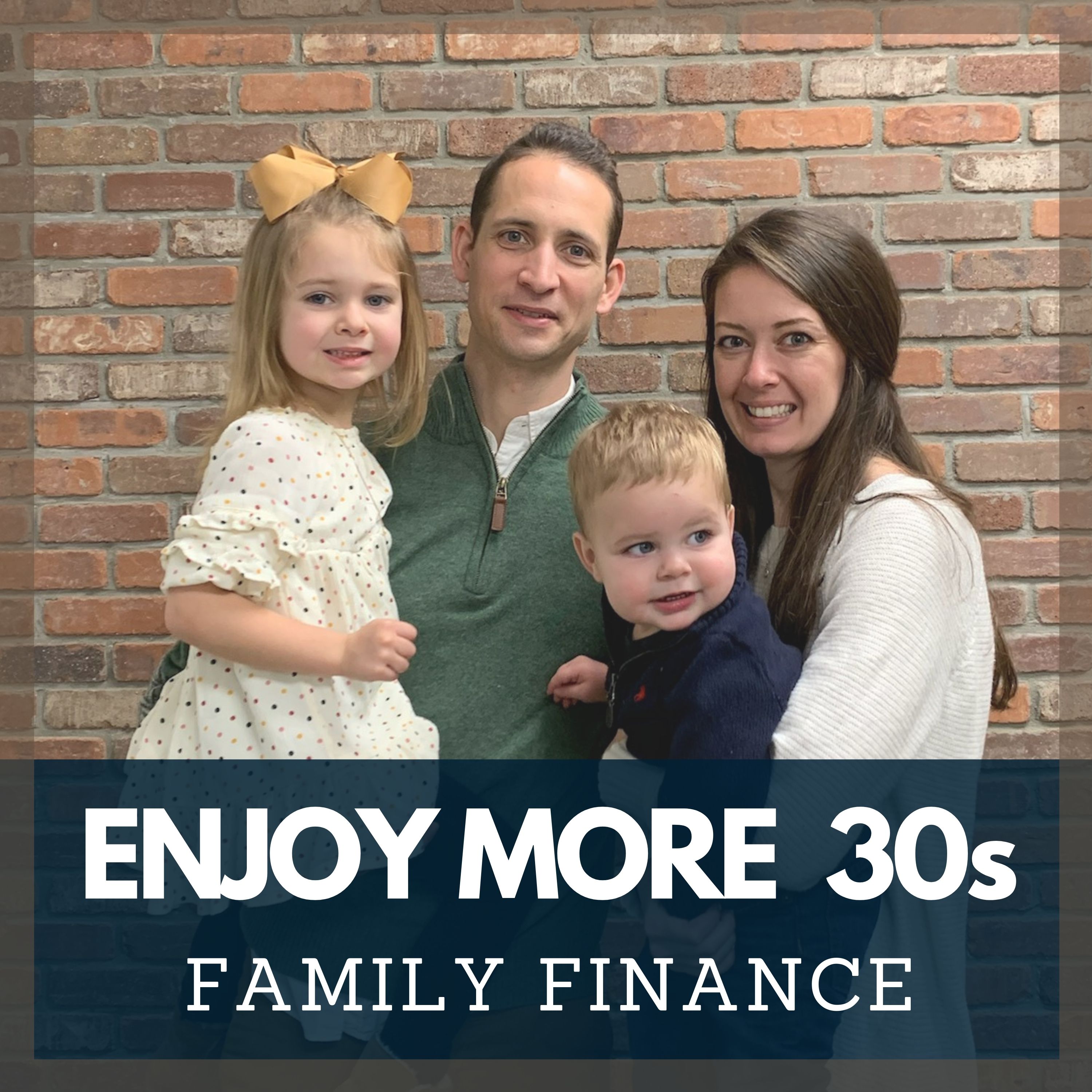Episode 1
How to Talk With Parents About Money | Series 3.1
Being able to talk to you parents about money may be more important than you think.
- Wanting them to make the most of their money (01:29)
- Your parents likely come from a different money perspective than you (05:36)
- Ask basic financial preference questions without giving your input (06:46)
Quote for the episode: "The goal is to start a conversation, not tell them why they're wrong."
Securities offered through TFS Securities, Inc., Advisory Services through TFS Advisory Services, a SEC Registered Investment Advisor Member FINRA / SIPC. TFS Securities, Inc. located at 437 Newman Springs Road, Lincroft, NJ 07738 (732) 758-9300.
Transcript
Welcome to the Enjoy More 30s: Family Finance
Voiceover Audio:podcast, the only podcast dedicated to making life more
Voiceover Audio:enjoyable for young families by hitting on the financial topics
Voiceover Audio:that tend to weigh on us, stress us out and distract our focus
Voiceover Audio:from simply enjoying life.
Joseph Okaly:Hello and welcome to the next series, which I
Joseph Okaly:really can't help but be pretty excited about for a couple
Joseph Okaly:different reasons here. This series itself is called "Your
Joseph Okaly:Parent's Money Mindset". And in it, we're going to tackle a
Joseph Okaly:number of aspects to help you address many times what's the
Joseph Okaly:elephant in the room, when it comes to your parents and money.
Joseph Okaly:Parents and money can be one of the most challenging scenarios.
Joseph Okaly:We are probably closer to them than most anyone else in the
Joseph Okaly:world, however, many times money might as well be spelled
Joseph Okaly:t-a-b-o-o, taboo. The biggest reason why this can be
Joseph Okaly:challenging is because it generally doesn't come up until
Joseph Okaly:a crisis hits. Mom or dad can't make their own decisions, maybe
Joseph Okaly:should no longer be making their own decisions and don't know it,
Joseph Okaly:or ran into some kind of an escalating expenses or health
Joseph Okaly:may have declined. All of which can eventually hit their
Joseph Okaly:children squarely in the face. Obviously 100% on board for
Joseph Okaly:helping the people that you know raised us, took care of us, put
Joseph Okaly:food in our mouths, put us on this track, this path to where
Joseph Okaly:we are today. But that doesn't mean the best time to start
Joseph Okaly:helping is when a crisis hits.
Joseph Okaly:The other aspect is really the opposite of that coin. Parents
Joseph Okaly:don't really know how much they have or what that translates
Joseph Okaly:into kind of many times and that's really the whole theme of
Joseph Okaly:this whole podcast. It's really not just them, it's everybody
Joseph Okaly:when there's not a financial education kind of prerequisite
Joseph Okaly:that's provided to all of us in school or growing up. And that
Joseph Okaly:manifests in either not living their own lives to the fullest,
Joseph Okaly:or maybe not really realizing that they're going to pass with
Joseph Okaly:a lot more money in their pockets than they expect. So
Joseph Okaly:when we speak with clients and show them what path they're on,
Joseph Okaly:many times we literally have to tell them, "If you continue to
Joseph Okaly:do what you're doing right now, you are going to die with a lot
Joseph Okaly:of money in your pocket. Is that your goal? Is that what you
Joseph Okaly:would prefer? Or would you rather get to share it with your
Joseph Okaly:kids now through vacations, gifting, or anything else and
Joseph Okaly:see that smile on their face when you're still alive." And so
Joseph Okaly:in 13 years now, I've yet to have anyone state the goal was
Joseph Okaly:to have really big stuffed pockets on their way out.
Joseph Okaly:If your parents always had money for whatever you guys may have
Joseph Okaly:needed, not that they were frivolous at all, but just you
Joseph Okaly:know, dance camp came up, they somehow found money for that.
Joseph Okaly:You had to go to college, they kind of somehow found money for
Joseph Okaly:that. You needed a car, they somehow kind of found money for
Joseph Okaly:that. You had braces, they somehow kind of found money for
Joseph Okaly:that. And if that was kind of how your parents mentality was,
Joseph Okaly:where they were kind of careful with money but they always were
Joseph Okaly:able to come up with whatever they needed, many times that's
Joseph Okaly:kind of the blueprint for this type of a person. They got to
Joseph Okaly:where they are today by being a little bit more on the frugal
Joseph Okaly:side overall, very careful with their money, making sure that
Joseph Okaly:they had what they needed. So now when they're retired, and
Joseph Okaly:maybe they have more than enough assets to be a little bit more
Joseph Okaly:free with more enjoying life with, it's hard to just flip a
Joseph Okaly:switch and say, "Okay, I spent the last 40 years really being
Joseph Okaly:careful with every penny. And now all of a sudden, I have this
Joseph Okaly:freedom to kind of spend." And it's not something that happens
Joseph Okaly:overnight. For us, it might take three, four or five different
Joseph Okaly:meetings with people to really convince them that, "Hey, you
Joseph Okaly:have this extra money. Even if you spend an extra $5,000 a
Joseph Okaly:year, the numbers say you're not going to run out of money even
Joseph Okaly:when we account for all these things that could go wrong."
Joseph Okaly:So today, we're going to cover what you need to know about how
Joseph Okaly:your parents relationship with money is likely very different
Joseph Okaly:from yours. And more importantly, what you can start
Joseph Okaly:doing to take steps in bridging that gap between you guys. So my
Joseph Okaly:daughter Avery is currently four years old. And as any four year
Joseph Okaly:old, she asks a lot of why questions. Why is the sky blue?
Joseph Okaly:Why can't we eat chocolate every day? Why does green mean go, and
Joseph Okaly:red mean stop? I really kind of liked that one in particular, by
Joseph Okaly:the way. But children have a completely different lens on the
Joseph Okaly:world and that's so fascinating. And at the same time, it also
Joseph Okaly:makes answering their questions somewhat difficult because
Joseph Okaly:they're coming from that different, you know, innocent
Joseph Okaly:perspective, that different plane compared to us. So
Joseph Okaly:recently we read David and Goliath, a story I would expect
Joseph Okaly:everybody to know. So if you remember in this story, David
Joseph Okaly:hits Goliath with the rock. And Avery asks, "Why did David hit
Joseph Okaly:him?" You know, this is supposed to be the crowning moment of the
Joseph Okaly:story where David triumphs, and all Avery could see was that
Joseph Okaly:David got angry and hit somebody else with a rock. So aren't we
Joseph Okaly:not supposed to hit people? Is Goliath okay? Well, it certainly
Joseph Okaly:caught me off guard. Am I supposed to, you know, go
Joseph Okaly:against everything that we've been talking about with her and
Joseph Okaly:just condone violence that, you know, if they deserve it, then
Joseph Okaly:you can hit them with a rock kind of a thing. If you're
Joseph Okaly:wondering, I instead went with a, "No, you shouldn't hit people
Joseph Okaly:Avery, you're right. David was just frustrated. I think he and
Joseph Okaly:Goliath probably afterwards used their words and became friends."
Joseph Okaly:So right, wrong and different, that's what I went with, and
Joseph Okaly:there you go.
Joseph Okaly:So what you need to know about talking to your parents about
Joseph Okaly:money is first that they come from a completely different
Joseph Okaly:perspective than you do most likely. While they didn't
Joseph Okaly:directly go through the Great Depression themselves, their
Joseph Okaly:parents did. And because of that, they likely were very
Joseph Okaly:influenced second hand by that Great Depression mentality, so
Joseph Okaly:to speak. The pay off your mortgage, keep your money under
Joseph Okaly:your mattress, in the banks kind of a thing. They perhaps don't
Joseph Okaly:like paying bills online or prefer paper statements.
Joseph Okaly:Finances overall may be very personal to them, very private
Joseph Okaly:to them. They probably don't like using Venmo, publicly
Joseph Okaly:posting that they are paying someone with, you know, a cute
Joseph Okaly:emoji at the end of it. Because you may come from another money
Joseph Okaly:mindset, it may be hard to have any money related conversations.
Joseph Okaly:And just taking that topic off the table is probably much
Joseph Okaly:easier many of the times. However, putting it on the table
Joseph Okaly:is the first step to building that bridge, and that's what I
Joseph Okaly:want to try to encourage you to do today.
Joseph Okaly:So what you can do is ask questions without providing
Joseph Okaly:advice or input. So that last part is very important- without
Joseph Okaly:providing advice or input. Start conversations that involve some
Joseph Okaly:financial aspect, just to start building a bridge of having that
Joseph Okaly:topic be something you can talk about, even if it's to a minimal
Joseph Okaly:kind of an aspect at the beginning. The initial goal here
Joseph Okaly:is to start a conversation. In the episodes that follow in this
Joseph Okaly:series, you're going to be able to build out your knowledge,
Joseph Okaly:extend the conversation, speak intelligently, so they could
Joseph Okaly:say, "Hey, you know, my kid kind of knows what they're talking
Joseph Okaly:about here." Maybe I can have a little bit more of a back and
Joseph Okaly:forth. But for today just focus on the goal of a conversation in
Joseph Okaly:and of itself. So here's some examples of what you can talk
Joseph Okaly:about. Again, careful not to tell them why you think they are
Joseph Okaly:wrong, if you do think they're wrong, but just to open that
Joseph Okaly:door, rather. For a lot of these questions, it's really just
Joseph Okaly:about expressing concern for their well being, which I'm
Joseph Okaly:pretty sure they'd appreciate.
Joseph Okaly:"Hey Mom, Dad. Just curious, do you use one bank? Or do you have
Joseph Okaly:a number of different banks that you use?" "Hey Mom, Dad. Just
Joseph Okaly:curious, do you like paying most of your bills online? Do you
Joseph Okaly:like paying them directly? What do you feel like works out the
Joseph Okaly:best for you?" "Hey Mom, Dad. Just curious, do you use your
Joseph Okaly:debit card mostly? Do you have a number of credit cards you use?
Joseph Okaly:Again, kind of, what works best for you? What do you find to be
Joseph Okaly:the best and most comfortable?" "How did you know when you
Joseph Okaly:should start investing? How did you kind of figure that out? How
Joseph Okaly:did you say, 'hey, I should start putting money away'? And
Joseph Okaly:how did you go about doing that?" "If God forbid anything
Joseph Okaly:ever happened to you, do you have some place with like
Joseph Okaly:documents? Or some person I'm supposed to go talk to?" "Hey
Joseph Okaly:Mom, Dad. You know, just urious, how did you know you
Joseph Okaly:an even retire? Like, how did hat dawn on you? How did you
Joseph Okaly:now, 'Hey, I have enough money for the next 30 years'? Did yo
Joseph Okaly:have a financial advisor ever d like projections for you to kno
Joseph Okaly:how much you could spend, or h w long your money might last
Joseph Okaly:" "Hey Mom, Dad. Just curious, o you have medical coverage wh
Joseph Okaly:n you're retired? I know I g t mine through work, but you don
Joseph Okaly:t work anymore. Do you still ha e coverage? How do you know wh
Joseph Okaly:t it covers and what it doesn t cover
Joseph Okaly:Every parent now is different. So maybe none of these will open
Joseph Okaly:the door even a crack, maybe there are other questions you
Joseph Okaly:can think of that might be more fitting for your specific
Joseph Okaly:parents. But coming from this place of concern, which you
Joseph Okaly:likely have for them anyway I would assume, is the best chance
Joseph Okaly:to have it be well received.
Joseph Okaly:So a quick recap of today. First is to acknowledge that money is
Joseph Okaly:hard to talk about. But there are significant reasons why you
Joseph Okaly:should think about having those conversations with parents. The
Joseph Okaly:first is to head off that bad track earlier than later. And
Joseph Okaly:secondly is to get them thinking about making the most out of
Joseph Okaly:their money that they've worked so hard to earn over their
Joseph Okaly:entire lifetimes. They may have worked for 30 years or more, so
Joseph Okaly:they really deserve to use that money and I'm sure that's what
Joseph Okaly:you want for them too. Know as well that they are almost
Joseph Okaly:certainly coming from a different mindset about money.
Joseph Okaly:Remember, no public Venmo purchases with emojis at the
Joseph Okaly:end. Lastly, start bridging that gap by asking very basic
Joseph Okaly:financial preference questions, or those that express concern
Joseph Okaly:without being invasive. I've said it many times again today.
Joseph Okaly:The goal is to start a conversation, not tell them why
Joseph Okaly:they are wrong.
Joseph Okaly:Thanks for tuning in today. As always, if you are able to
Joseph Okaly:implement what we cover, that's fantastic. You have less to
Joseph Okaly:worry about than before, and can focus more on enjoying life. If
Joseph Okaly:you are wanting help with these things though, or have questions
Joseph Okaly:you need help in clarifying, check out the 'Ask Joe' section
Joseph Okaly:on the show's website. www . enjoy more 30s .com, that's
Joseph Okaly:enjoy more three zero s .com. If you enjoyed this episode
Joseph Okaly:specifically, please make sure to subscribe and review us on
Joseph Okaly:Apple podcasts or wherever you listen. There are literally
Joseph Okaly:millions of young American families out there I'm trying to
Joseph Okaly:reach and help just like you. Clicking a star, writing a
Joseph Okaly:review really goes a long way. The next episode is "Your
Joseph Okaly:Parents Trust Their Advisor", where we are going to extend now
Joseph Okaly:into if you can open that door of conversation, who are they
Joseph Okaly:probably taking advice from already, and what does that
Joseph Okaly:advice maybe look like? Until next week, thanks for joining me
Joseph Okaly:today and I look forward to connecting with you again soon.
Voiceover Audio:The conversations on this show are
Voiceover Audio:Joe's opinions and provided for general information purposes
Voiceover Audio:only. They do not constitute accounting, legal tax or other
Voiceover Audio:professional advice for your specific situation. You should
Voiceover Audio:always seek appropriate advice from a financial advisor,
Voiceover Audio:accountant, lawyer or other professional before acting upon
Voiceover Audio:any content or information found here first. Joseph is affiliated
Voiceover Audio:with New Horizons Wealth Management LLC, a branch office
Voiceover Audio:of TFS securities Inc and TFS advisory services, an SEC
Voiceover Audio:registered investment advisor member FINRA/SIPC.


